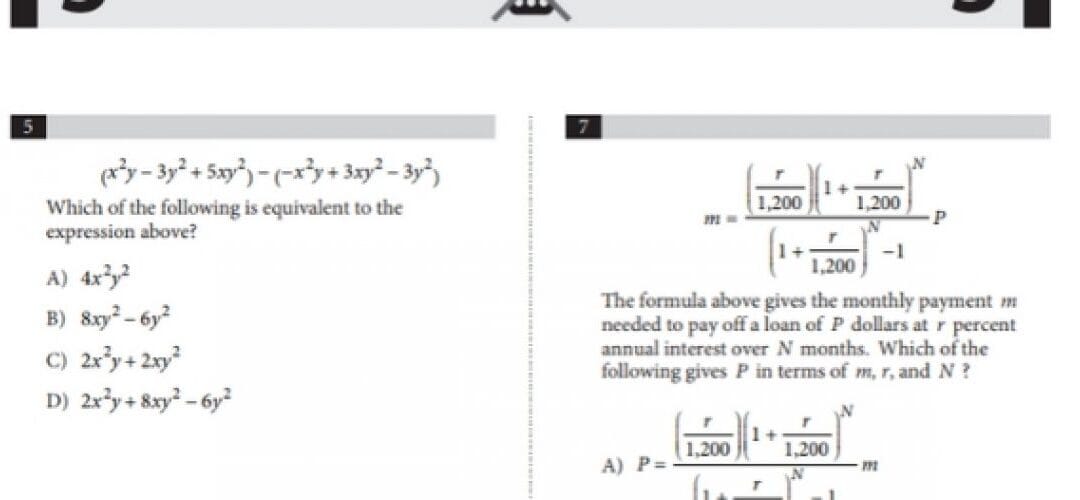By Paul Culp, MA (Oxon.), CFT, GCDF, CCSP
The SAT and ACT are and long have been a fact of life for most high school students who plan to attend college. While some colleges and universities have begun experimenting with test-optional admissions, most continue to embrace nationally standardized tests as means of offsetting uncertainty about student readiness owing to widely varying standards from school to school. Nearly two million students per year take each of the tests, and all four-year colleges and universities in the U.S. accept both.
The SAT (the letters originally stood for Scholastic Aptitude Test and now stand for nothing in particular, much like PPG and BP) was introduced in 1926 and is now owned and published by the non-profit College Board. The ACT (originally American College Testing) was introduced in 1959 as competition for the SAT and is owned and administered by the non-profit ACT, Inc.
Both tests have been revamped numerous times since inception, with the differences between the two gradually diminishing, and in terms of their acceptability to colleges they are on equal footing. Some states require all students to take one or the other, however, with the ACT being more commonly required, so if you want to avoid unnecessarily preparing for two tests, it’s wise to find out whether your state has a particular specification.
It’s also essential to recognize that the SAT and ACT are still not exactly interchangeable in terms of what they test and how they do it, and students trying to decide between them should be aware of some noteworthy dissimilarities.
While the SAT and ACT allow roughly the same amount of time for completion—the SAT is three hours without the optional essay and 3:50 with the essay, versus 2:55 and 3:35 for the ACT—the tests are arranged rather differently and do not have the same number of questions. Each has five sections:
ACT SAT
| English, 45 minutes, 75 questions Reading, 65 minutes, 52 questions |
| Math, 60 minutes, 60 questions Writing and language, 35 minutes, 44 questions |
| Reading, 35 minutes, 40 questions Math (no calculator), 25 minutes, 20 questions |
| Science, 35 minutes, 40 questions Math (with calculator), 55 minutes, 38 questions |
| Writing (optional), 40 min., 1 essay Essay (optional), 50 min., 1 essay |
You don’t have to excel at math to figure out that the SAT allows more time per question on all sections, something worth considering for students who are especially wary of time constraints.
Another enhancement to time-management on the SAT is that in the reading section the questions are in chronological order in terms of the material to which they refer within a passage. ACT reading questions are in random order, requiring test-takers to roam up and down within the passage, looking for answers.
On the other hand, sometimes the reading questions on the SAT relate to each other rather than just to the passage; one question may refer to another question, which some people find complicated. For instance, you may be asked to indicate the number of the line of text in which you found the evidence supporting your previous answer.
The ACT does feature fewer reading passages—four to the SAT’s five.
One of the most obvious differences between the two tests is that the SAT doesn’t have a separate science section. It does employ questions on scientific concepts in other sections, and score reports include a science subscore, but Prepscholar.com suggests that the subscore will attract less attention than the results on the ACT’s separate science section and may be overlooked entirely, so the ACT might be a better choice for students who excel at science and who want their scientific acumen on prominent display. Be that as it may, the ACT science section actually requires little outright scientific knowledge, the emphasis being primarily on the ability to analyse charts and graphs.
Comparisons become considerably more complex when we examine the math sections:
The relative merits of the math components are somewhat mixed. Students who doubt their ability to work quickly without a calculator might prefer the ACT, which does not have a no-calculator math section at all, while the SAT’s no-cal math section allows only 25 minutes for completion. The ACT also is entirely multiple choice, while the SAT also includes some math questions that require test-takers to fill in their own answers.
However, the ACT provides five multiple-choice options on each math question, while the SAT provides only four. This means you have a better chance of guessing right on the SAT. Furthermore, while both tests are strongly algebra-oriented, the ACT places a heavier emphasis on geometry and trigonometry—a quarter to a third of math questions, as opposed to about 10 percent on the SAT—and it includes probability and statistics. The ACT also does not provide mathematical formulae, while the SAT does.
So the SAT math component appears to be possibly the less demanding of the two—but not so fast. Here’s where we need to talk about overall scoring:
With the ACT, each of the four main sections is scored on a scale of one to 36, and those four scores are then averaged to produce the overall ACT score. On the SAT, however, the verbal and math components—one of each—are graded on a scale of 200 to 800 and then added for the total SAT score. In other words, math counts for half of your composite score on the SAT, as opposed to one fourth on the ACT. (The optional essays present an opportunity to demonstrate ability but do not figure in the final overall score.)
Let’s say, for example, that you take the ACT and score 18 out of 36 on the math, and a very commendable 30 on everything else. Your overall score is 27 out of 36, which puts you in the 87th percentile. And let us say that you perform at a similar level on the SAT, with a 400 on the math and 664 on the verbal. That comes out to a combined score of 1064, which lands you in the 52nd percentile. Despite some apparent advantages, the SAT turns out to be anything but a refuge for the mathematically challenged.
As for the optional essay component, this is a matter of differing abilities and tastes. The SAT requires the test-taker to read a passage and analyse the strengths and weaknesses in its argument. Comprehension, analytical skill, and reasoning capacity are at a premium. The ACT on the other hand requires the test-taker to compare and contrast different viewpoints, weigh them, and take a position. Thus the skills required by the two tests do overlap to some extent, but the differences are very real.
Experts in the test-preparation field have generally maintained that the SAT tends to be a measure of critical thinking and problem-solving ability, or aptitude, while the ACT is more of a measure of academic achievement, of knowledge accumulated in school. However, the difference between the two tests has narrowed considerably since the SAT was thoroughly overhauled in 2016.
As of this writing, most of the articles on the internet comparing the SAT and ACT are now badly out of date, so students should tread carefully in performing research and making decisions.
In the final analysis, neither test can be described as easier or more difficult than the other. Students trying to decide between the SAT and ACT should try to discern their own strengths and weaknesses and choose accordingly. Free practice tests are readily available online and can be a valuable aid to getting a feel for the two tests and choosing between them.
The cost difference between the SAT and ACT is negligible. The basic fee for taking the SAT currently is $47.50 without the essay and $64.00 with the essay, while the ACT runs $50.50 and $67. For both tests, other fees may apply, as in changes in date and venue, requests for additional score reports, waitlisting, and other services.
TCE knows the SAT and ACT!
The Coaching Educator is not a test preparation service per se, but we have mastered the process of helping students get into and succeed at the right college, and that includes sharing what we know about the SAT and ACT determining which test is right for them and helping them find and utilize the tools necessary for sound preparation and strong performance. We can keep you on schedule and on task throughout. To learn more about our philosophy and capabilities, be sure to watch our free webinars, listen to our podcasts, sign up for our four-week College App Boot Camp, consider our Ultimate Programs and our special services for athletes and performing-arts students, and book a consultation to hear what we can do for you and how we do it. Keep reading this blog, and look for us on social media (see links below) as we keep our clients and admirers advised of new developments in our effort to help students get into and succeed at the right school.
Paul Culp is certified as a global career development facilitator and writes about college admissions, college costs, financial aid, and college life in general for The Coaching Educator team. A former journalist and corporate ghostwriter who now operates Shenandoah Proofreading, Editing & Composition Services (SPECS), he has also been a humanities teacher at all levels from university down to sixth grade. Paul has degrees from Oxford University, Jacksonville State University, and Samford University, and also is certified as a fitness trainer.
Recommended Reading About College Admissions and College Life
Culp, Paul. “Getting to Grips With Test Anxiety,” The Coaching Educator, 28 November 2018, http://tce.local/2018/11/28/getting-to-grips-with-test-anxiety/
Culp, Paul. “Remedial Nation: The Ghastly State of College Preparedness,” The Coaching Educator, 19 January 2019, http://tce.local/2019/01/19/remedial-nation-the-ghastly-state-of-college-preparedness/
Culp, Paul. “Technology, Intangibles, and the Brave New World of College Admissions,” The Coaching Educator, 29 May 2018, http://tce.local/2018/05/29/technology-intangibles-and-the-brave-new-world-of-college-admissions/
Support smart students and spread the word:
https://www.facebook.com/thecoachingeducator
https://www.youtube.com/user/KeirinCarroll
https://twitter.com/TCEducator
https://www.instagram.com/thecoachingeducator
https://www.linkedin.com/company/thecoachingeducator
Follow us on:
YouTube: https://tinyurl.com/yy5yssq8

